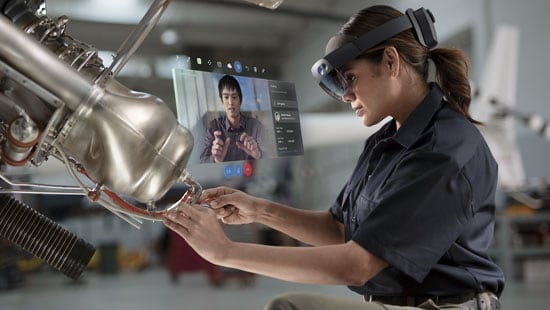Ecolab expert explains how COVID-19 is driving the use of mixed reality and other new digital tools in the energy industry

Ecolab is using mixed reality technologies and newly developed digital tools to deliver critical support to its energy customers during COVID-19. Recent examples include the mixed reality-enabled installation of three PURATE chlorine dioxide generators for a leading midstream company and supporting technical trials for a southern utility company that serves one of the largest U.S. states.
Katy Cope shares her insights on the two major forces affecting the energy industry today — COVID-19 and digitalization — and how new digital tools are enabling the energy industry to progress operations during the pandemic.
How is Ecolab using mixed reality to bolster energy company operations during COVID-19?
Cope: Ecolab leverages Microsoft’s mixed reality technology, enabling us to gain remote access to our customers’ facilities. Ecolab’s sales and technical representatives in the field can wear Microsoft HoloLens devices, which allows them to virtually connect to Ecolab’s scientists, engineers and cross-functional teams for support. This allows Ecolab to remotely diagnose and troubleshoot issues around contamination, our engineers to oversee chemistry usage, guide the installation of new equipment, monitor water quality, help train new employees, and ultimately, implement solutions. Response times are quicker and multiple experts can collaborate to diagnose and troubleshoot customer problems without having to travel to the site. Mixed reality enables us to ensure social distancing during COVID-19 and it gives Ecolab access to facilities that have closed or restricted access during the pandemic, helping to keep them operating when they have faced reduced operations or complete shutdowns.
What are some specific examples of problems you have solved using mixed reality?
Cope: We recently used mixed reality to complete our first major equipment installation enabled by the technology for a leading U.S. midstream company. A team of Ecolab engineers was able to guide a single Ecolab field representative through the installations at three separate plants. For one of the largest public utility companies in the Southeast, Ecolab remotely supported technical trials using mixed reality. We’re using mixed reality with customers in a wide range of industries and will take these lessons back to the energy industry. Some of those examples include identifying and fixing tank leaks, recognizing and eliminating equipment malfunctions, and correcting wastewater flow rates and coagulant efficiencies. We also use this technology to conduct training. Very few people were needed to achieve these successful outcomes. In most cases a technical coordinator and remote maintenance tech used the technology to diagnose issues and communicate with each other while the solution was being implemented.
How are other digital tools changing the way Ecolab customers operate, particularly in industrial settings?
Cope: Ecolab’s water management business Nalco Water, has launched several digital tools built on the ECOLAB3D™ analytics platform, leveraging the data derived from Ecolab’s Internet of things (IOT), artificial intelligence, automation and analytics operations. Companies can monitor water, energy and financial performance without being on site or waiting for test results from labs. Water chemistry testing time for waterborne bacteria, for example, has dropped from two days to 15 minutes. Where some solutions to reduce corrosion in water systems may have taken six months, it has been reduced to hours or days. Water and energy savings are also helping companies meet corporate sustainability goals. Digital tools are boosting efficiency and avoiding downtime, which is always critical, but particularly so during COVID-19 when so many people are relying on a robust energy supply.
In a post-pandemic world, will these changes last?
Cope: Definitely. The pandemic has sped up the process for energy companies to adopt digital tools, and they are certainly realizing their value. The time and money savings are undeniable. Now that companies are understanding the value of the data they have, and how IoT, artificial intelligence, predictive analytics and automation can dramatically improve their operations, they won’t go back. For many, it’s also a shift in business model. Companies that do not make use of these tools could place themselves at a competitive disadvantage. Digital tools are improving product quality and production volume. We’re entering a new era.
Click here to learn more about how digital tools are affecting the Energy industry.
About the author:
Katy Cope
Vice President of Marketing
Global Heavy Industries
Katy is vice president of marketing for global heavy industries at Nalco Water, an Ecolab company, the global leader in water, hygiene, and energy technologies and services that protect people and vital resources. Katy is responsible for the market strategy, communications and commercial offering development that help heavy industrial companies operate more efficiently and increase their reliability and productivity by minimizing water use, maximizing performance, and optimizing costs across power generation, steel and aluminum manufacturing and chemical processing.

